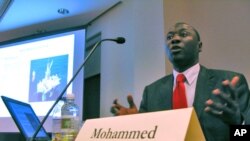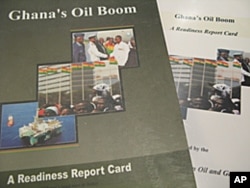While Ghana has just started making money from its offshore oil, civil society advocates and economists are warning not enough is being done to make sure oil wealth is a benefit and not a curse to Ghanaians. At a Washington event late Thursday, they said Ghana's government needs to have more planning and transparency to avoid a repeat of the massive corruption and violence that has plagued other oil-rich African countries.
The World Bank country director for Ghana, Ishac Diwan, said the stakes were high for Ghana's new oil reality, as more and more offshore fields are discovered in West Africa's Gulf of Guinea.
"Can Ghana do it is a big question. It would be a premiere actually and it would show the way to the Sierra Leones, the Liberias and Guineas, new democratic Guineas. So it is an extremely important experiment if I may say," Diwan said.
At an event organized by the non-governmental organization Oxfam America, Ghanaian civil society groups presented a report called "Ghana's Oil Boom: A Readiness Report Card."
It gave a mark of Cs, or fair, to all involved in the process, including donors like the World Bank, and civil society groups themselves.
Mohammed Amin Adam said civil society was trying hard but so far failing to get new laws signed and put into effect to force full contract disclosures between the government and oil companies as well as make the government show how it spends its oil revenue.
Adam said this transparency is necessary given the huge expectations Ghanaians have. "If you are transparent of how much you are receiving, how much you are spending, where you are spending it, those expectations will be moderated by themselves. And so the key here is transparency," Adam said. "And this is why I will even build more expectations back in Ghana to put pressure on our government to invest this money well and transparently so that everybody knows where the money is going to and they can tell realistically what oil can offer and what oil cannot offer."
He also expressed disappointment Ghanaian delegations had been sent to far away Trinidad and Tobago and Norway to learn from their oil experiences, rather than going to nearby Nigeria, to find out more about the difficult lessons learned there.
Another civil society representative, Nana Ama Yirrah, said Ghanaian villagers in western coastal areas nearest to the oil fields were already complaining about higher prices, pollution, fishing restrictions, and a lack of opportunities in the oil sector.
"The skills required for the oil industry is nowhere found within the communities, the kind of businesses that people are managing today in Ghana, the standards within those businesses are not the type that can fit into the oil industry. So it has become a very dicey issue that production has started and yet people are not seeing what they thought they would see," Yirrah said.
Production started in December, and should reach output of 120,000 barrels per day within the next few months. Estimates are that Ghana could earn more than $1 billion a year from its existing Jubilee offshore oil field, and that further discoveries could boost these numbers.
Peter Allum, the chief of the Africa department at the International Monetary Fund, said it was essential Ghana's government started making longer budget planning to figure out what to do with this money, and extend the current year to year approach.
"The budget ought to have a medium term vision so there is a clear relationship in the budgetary process between the medium term revenue stream or wealth associated with oil and what is envisaged to be done with that in the way of financing projects over a multi-year timetable," Allum said.
Ghana's ambassador to the United States Daniel Ohene Agyekum said it was important to focus on the positives, and the vibrant debate that is taking place to make sure Ghana's oil is a benefit.
"There is no need to apportion blame to any particular group. We all recognize the good work that as a collective we have done to move the oil industry much ahead of time. And I am proud to say this as a Ghanaian," Agyekum said.
The ambassador also agreed with other panelists that while a lot of focus is being put on oil, this should not mean Ghana's important agricultural sector should be diminished.





